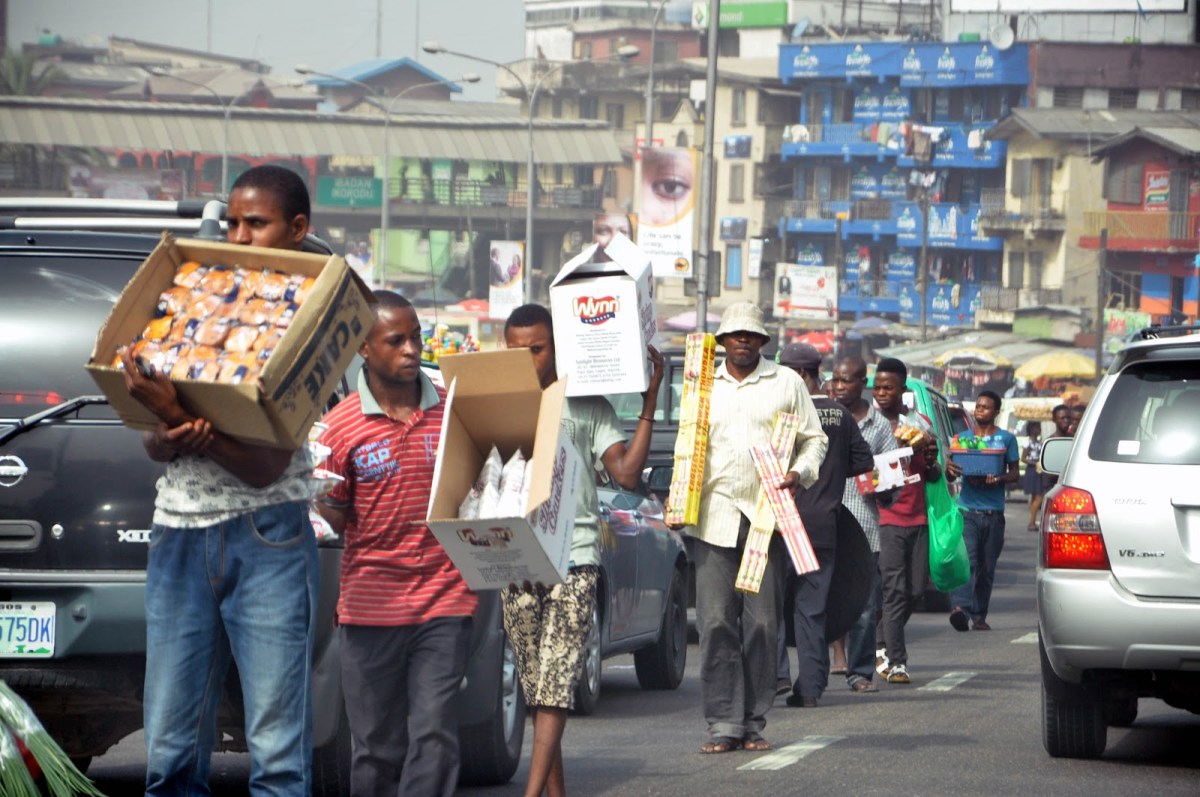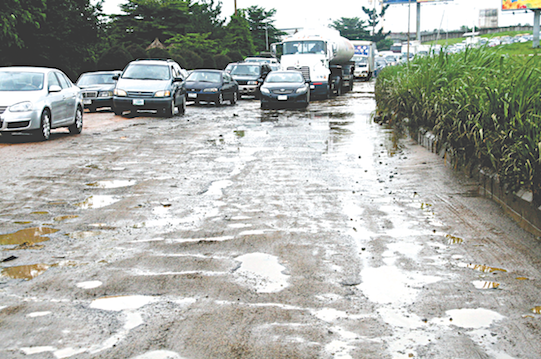Street hawking has been an economic lifeline for many people at the bottom of the economic pyramid in developing countries, prevalent within urban and suburban contexts. It has allowed poor, mostly uneducated, unskilled people, to eke out a living with meager or no capital investment and without the expense of maintaining business space, formal registration or documentation.
The Merriam-Webster dictionary defines a hawker as one (whether stationary or mobile) who offers goods for sale, usually in small quantity, by calling out in the street.
This growing segment of the vulnerable poor population is part of the informal sector that made up 58.82% of Nigeria’s 2015 (Gross Domestic Product (GDP) as reported by the National Bureau of Statistics (NBS), yet its potential for growth of the nation’s growth has been oft neglected or criminalised; with states enacting laws forbidding hawking.
In all fairness, one can understand the menace associated with street hawking, the matter of potential safety and other traffic hazards for the hawkers and road users, and other perceived challenges of harnessing the economic benefits, blindly onlookers from seeing them as potential labour force that could contribute to government’s revenue generation. However, with all of the effort being made to gather national and subnational human index data, it is more than tenable that this powerful market force can be a catalyst for improving GDP, standardisation of goods and equitable labour practices.
Advertisement
Why street hawking?
For many, street hawking is a necessary source of livelihood, a hobby and culture of its own; into which people easily socialise; especially migrants to urban settings. Some people engage in street hawking because it is their only opportunity for self‐reliance, while some children do so for the either as support to their family, for the thrill of freedom on the streets or just because their peers do so.
The issue of street hawking has continued to swell due to high rates of unemployment, poverty, inflation, poor educational performance, unstable families, peer group influence, large family size, poor parental care, traffic congestion, lack of employable skills, divorce/separation or loss of spouse, minimal-capital entry requirement, and in cases when some children run away from their parents/guardians.
Advertisement
The increasing scourge of poverty and worsening economic condition in Nigeria have in turn led to a drastic rise in rural to urban migration in search of better livelihood, while those with limited education, skills, funds or planning, end up in street hawking as the easiest means of livelihood.
For example, the NBS indicates that youth unemployment rate in Nigeria increased to 21.5% in the first quarter of 2016, compared with 19% in the fourth quarter of 2015.
Some of the street hawkers are victims of human trafficking from neighbouring states or other African countries, and many are children given away by their parents on the premise that they would receive food, shelter, good education and care from their guardians.
Negative implications of street hawking
Advertisement
Studies reveal that street hawking has raised several social issues, especially, for vulnerable people such as women and children. For instance, irrespective of who (age and sex) engages in it, street hawking is always associated with physical, sexual and verbal assault, road traffic accident, kidnapping, ritual killing, exposure to harsh weather conditions, child trafficking and other vices. It also affects the academic performance of school age children, exposes them to sexual assaults, and physical exhaustion.
It also leads to increased exposure to antisocial activities like smoking, drug and alcohol abuse, cultism and crime. Sometimes, this poses security risks in the society, and gives the impression of a disorderly society.
The environmental
A huge percentage of commercial streets and gutters are filled with non-biodegradable waste plastic bottles and sachets. Mostly, this happens as a result of littering by hawkers or buyers who patronise their products. Such activities may undermine the effort of the government to keep the environment clean. This adds to environmental degradation when the sub-optimally available drainages are blocked leading to flooding and increased breeding of mosquitoes. In addition, lack of proper waste management and sanitation result in unhygienic market conditions, which jeopardise the health of the hawkers, their customers, and the community.
Advertisement
How hawking can contribute to national economy
As an integral part of the economy, street hawking has positive economic dimensions for job creation, income generation and easy access to a wide range of goods and services which in turn increase the velocity of money in the economy. For instance, in Hong Kong, the Informal Economy Monitoring Study (IEMS) reveals ways in which street [hawkers] in five cities have strengthened their communities, as: most street vendors provide the main source of income for their households, bringing food to their families and paying school fees for their children and many generate revenue for cities through payments for licenses and permits, fees and fines, and certain kinds of taxes.
Advertisement
What this means for us is that with their contributions as economic agents, street hawkers could be helped like other businesses, rather than hindered.
Fostering Inclusive Development through Integrating ‘Street’ Economy into National Planning
Advertisement
Two key decisions are vital to achieve the integration of that informal economy into national planning; formalising the economic activities of street hawkers and providing greater social protection for them.
Integrating and legalising hawking into the official economy
Advertisement
A London-based independent policy institute, in their report titled: “Nigeria’s Booming Borders The Drivers and Consequences of Unrecorded Trade,” revealed that despite the size of Nigeria’s Gross Domestic Product (GDP), estimated at $510 billion, businesses remain largely informal, unrecorded and untaxed. This, it stressed, leaves much of the country’s economic potential unrealised.
While street hawking has been criminalised in certain parts of the country, the way forward is actually legalization. There will be no fiscal contribution of street hawking in Nigeria without the legalisation of their activities; taxes cannot be generated from the hawkers without a proper inclusive structure that enables them to obtain license from the government. Some of these hawkers are distributors or employees of bigger – sometimes international – informal businesses whose mission is to evade tax, and who may be flooding the market with unsubstantiated and inferior products. Regularisation, licensing and taxation of their street vendors, will expose the source of their products and will ensure that revenues of these bigger businesses contribute to the nation’s revenue generation. To benefit optimally from this segment of the informal sector, government should strategically integrate and encourage millions of these businesses into the formal economy.
In the process of regularisation, there is need to guard against unintended negative consequences, which exclude rather than protect the hawkers – such as licensing bottlenecks, corruption and bureaucracy – while integrating them into the formal economy.
Membership-based organisations
Structured hawkers’ membership-based organisations are essential to helping them build solidarity and navigate their relationship with regulators and local authorities. For example, the Self-Employed Women’s Association (SEWA), the National Association of Street Vendors of India (NASVI), and the members of the Women in Informal Employment: Globalizing and Organizing (WIEGO) Network, were instrumental in making India’s National Law on Street Hawking a reality. This national law recognises, regulates and protects the livelihoods of street hawkers. Some of these street hawkers’ organisations work with local authorities to formulate innovative policies, programmes and practices that enable hawkers to have a voice in making the society more inclusive.
Capacity building and microfinance support
Responding effectively to the needs of street hawkers requires structured capacity-building training of unskilled or uneducated people and providing them with better social welfare. For instance, many can be trained on effective sales and management, financial management, professionalism and environmental management. Street hawkers or their associations can be held liable for the sanitation of their primary hawking locations and can be preemptively trained to dispose of waste sustainably; which can help build our budding waste recycling efforts and drive for renewable energy. Categorically stated, through effective management, the nations can build a lot more entrepreneurs through strategic enterprise development programmes.
Conclusion
Harnessing the prospects available in street hawking is tantamount to addressing a diverse number of Sustainable Development Goals (SDGs) as recommended by the United Nations and adopted by leading nations, which are critical to Nigeria’s economy; including: No Poverty (SDG 1), Zero Hunger (SDG 2), Reduced Inequalities (SDG 10) and Climate Action (SDG 13).
According to Yip Po-Lam, convener of a grassroots concern group for hawkers in Hong Kong, “Supermarkets…will soon become the only choice [for shoppers]. If you see the issue from the point of view of poverty alleviation, culture and tourism or the local economy, then you should grow [the practice of hawking].” Therefore, the prohibition of this segment of economy, does not only affect the means of living of the people at the bottom of the economic pyramid but also affects the cultural heritage of the people, the revenue base of the country and negates the inclusive development agenda of the United Nations’ SDGs.
Written by CSR-in-Action, an organisation with the vision to propel collective transformative action in Africa
Views expressed by contributors are strictly personal and not of TheCable.
Add a comment






